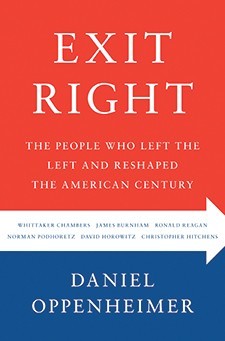By Dan Williams
After critiquing American imperialism for decades, columnist and social critic Christopher Hitchens’s continued support for the Iraq war remains somewhat of a mystery of an otherwise brilliant career.
In his 2016 book, Exit Right, Daniel Oppenheimer looks at Hitchens’ alleged move from the left to the right, along with five other political figures, trying to understand each one’s motives. It is a valuable book for understanding the current political landscape.
Though the entire book is worth reading, the chapter on Hitchens initially caught my eye. Hitchens was enormously popular when I was growing up. God is not Great came out when I was a sophomore in high school, and his iconoclastic take on religion was irresistible.
Politically, his eloquence was truly inimitable. In his early years, his logic, too, was impeccable. He had a talent for the theater of political debate and was capable of mustering rhetoric to devastating effect. What budding teenage intellectual didn’t want to develop her or his own “Hitch slap”? (One notices a rather venomous version of this in Milo Yiannopoulos.)
The most politically controversial position Hitchens took, however, was on the Iraq War. His vehement support and justification for the war signaled to many a decisive break from the anti-imperialist left of his early years. But Oppenheimer errs on the reductive side when he writes, “Having preserved his moral cleanliness for decades precisely by puncturing grand narratives rather than embracing them, Hitchens was finally ready for his great cause.”
If one reads Hitchens’ essays written immediately after 9/11, collected in Love, Poverty, and War, one can still feel the rawness of the event, the immediate aftermath, and Hitchens’ repugnance for any feelings of collective guilt and moral equivalency of the sort that Noam Chomsky was airing — a kind of “we deserved it for what we’ve done.” Hitchens saw this, rightly, as depraved masochism.
Hitchens always had a strong strain of English Republicanism in him, one of the reasons he so admired the American Revolution, which, in its philosophical underpinnings, was an English revolution. And a central tenet of English Republicanism was a respect for individual liberty against a tyrannical state.
Throughout the 1990s, Hitchens became increasingly disgusted with the neoliberal consensus between Republicans and Democrats, which he saw as a dangerous move toward a one-party state. And for this reason, I do not think that we can really follow Oppenheimer in saying that Hitchens “exited right.” Oppenheimer contends that Hitchens’ support for the Iraq War constituted not only an apostasy from the left but an accompanying joining of the right. What this is better interpreted as is an unprecedented instance of Hitchens “going along” with the consensus.
It will be remembered that the only politicians who opposed the Iraq War were those on the far right and the far left.
What was surprising was that Hitchens never backed down from his initial position, that the United States had done the right thing in toppling Saddam Hussein’s ruthless dictatorship — even when it became clear that the public had been lied to, that there was good evidence to believe that the war itself, however liberating for the Iraqi people it could have been, was in fact a botched enterprise.
Oppenheimer is right to title his chapter on Hitchens “A Man Alone,” for his apostasy from the left was less a move from left to right as a declaration of independence from the left. History may judge Hitchens harshly on the Iraq War, but it should not judge him as “switching teams.” In the pursuit of truth and justice, he was, and remains, a man alone.









